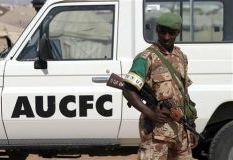Security Council to endorse joint UN-AU Darfur force
May 25, 2007 (UNITED NATIONS) — The UN Security Council met Friday to endorse a report on a planned UN-African Union joint peacekeeping operation in Darfur which calls for deploying a robust, mobile force of around 20,000 troops with Khartoum’s consent.
 The council’s 15 members huddled behind closed doors to agree a non-binding statement that would approve the report on the so-called “hybrid” UN-AU force at the request of UN chief Ban Ki-moon.
The council’s 15 members huddled behind closed doors to agree a non-binding statement that would approve the report on the so-called “hybrid” UN-AU force at the request of UN chief Ban Ki-moon.
On Thursday following consultations with AU Commission Chairman Alpha Oumar Konare, Ban Ki-moon submitted the detailed blueprint to the Council.
Under a three-phase UN plan floated last year by then-UN chief Kofi Annan, the joint force is to take over peacekeeping from 7,000 under-equipped AU troops that have failed to stem four years of bloodshed in Darfur.
US Ambassador to the UN Zalmay Khalilzad, who chairs the council this month, told reporters that the statement under consideration aimed “not only to endorse the (UN-AU) agreement but also to call on the government of Sudan to accept it in short order.”
The text would also take note of other council resolutions “that call on all parties to stop attacks on civilians, cooperate with humanitarian efforts, cooperate in the political resolution of the issue, stop aerial bombings and attacks on peacekeepers,” he added.
Asked why the council has so far been unable to agree the statement, Khalilzad responded: “different people have different views … We are working on it. We’ll see whether we can reach an agreement today or (whether) it will go into next week.”
The report makes it clear that the UN-AU operation “requires the consent and full cooperation of the government of Sudan and all parties.”
It outlines two options for a mobile force “capable and ready to deter violence, including in a pre-emptive manner” and which would have “surveillance capabilities … in addition to air and response forces necessary to address to security.
— A force of 19,555 troops made up of 18 infantry battalions, three infantry reserve companies, three surveillance companies and a force reserve company; three fixed wing surveillance aircraft, six to eight helicopters for tactical use and 18 military helicopters; and up to 120 liaison officers and 240 military observers.
— Or a force of 17,605 comprising only 15 infantry battalions and three rapid reaction companies “in order to compensate for the reduction in the infantry level through rapid response by air.”
A police component comprising 3,772 officers and 19 units will be tasked with helping Sudanese law enforcement restore security and protect civilians.
The military component of the force would be deployed throughout Darfur, a territory roughly the size of France, and organized in three sectors: North, South and West.
The mission’s mandate will be to protect civilians, facilitate full humanitarian access and the return of refugees and internally displaced persons and restore security in Darfur through the implementation of the Darfur Peace Agreement (DPA) signed last May between Khartoum and the main rebel group.
The report stresses that the deployment of the hybrid force presupposes that the first two phases of the UN plan are implemented successfully and that the AU contingent in Darfur “is significantly strengthened.”
Last month, Khartoum accepted the second phase of the plan under which roughly 3,000 UN peacekeepers — mostly military and police staff — are to provide logistical, communications and air support to the AU force.
The report warns that deploying the joint UN-AU force “in the absence of an all-inclusive political agreement on a broadened DPA is a significant risk.”
It calls for a broadening of the DPA to include those rebel groups that did not sign it last year and warned that “the scale of recent inter- and intra-tribal fighting reinforce the need for an all inclusive and comprehensive process.”
In view of the regional dimension of the Darfur conflict with its spillover in neighboring Chad, the report stresses the need for a normalization of ties between Khartoum and N’Djamena.
At least 200,000 people have died and more than two million more fled their homes since the Darfur conflict broke out in 2003 when government forces including its Janjaweed Arab militias began fighting rebel groups who had taken up arms in protest at the distribution of resources.
(AFP)
